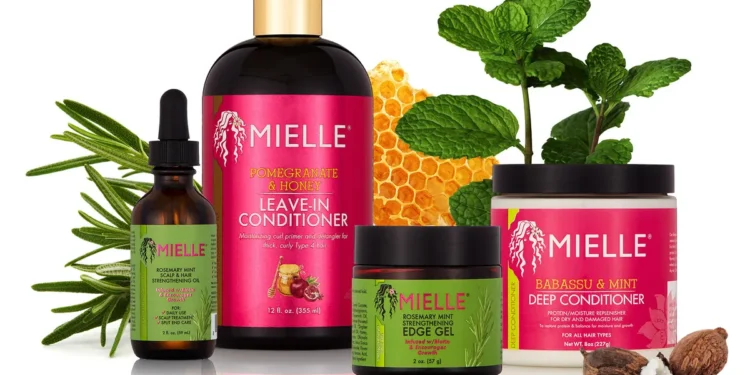Introduction
The natural hair care industry has experienced a transformative shift over the last decade, with more consumers demanding transparency, inclusivity, and product integrity. One of the most prominent names in this sector is Mielle Organics—a brand celebrated for its dedication to natural ingredients and the health of textured hair. However, recent developments have placed the brand under intense scrutiny. The Mielle lawsuit has surfaced as a controversial topic, raising concerns about product quality, transparency, and corporate influence following Mielle’s acquisition by Procter & Gamble. In this article, we unpack the details of the Mielle lawsuit and what it means for consumers in 2025.
About Mielle Organics
Founded in 2014 by Monique Rodriguez, Mielle Organics quickly rose to fame as a trusted brand among women of color seeking high-quality hair care products designed specifically for textured hair. With natural ingredients at its core and a community-first ethos, Mielle became more than a brand—it became a movement. Popular products such as the Rosemary Mint Scalp & Hair Strengthening Oil and the Babassu Oil & Mint Deep Conditioner helped secure Mielle’s place in countless bathroom cabinets across the country.
However, in 2023, Mielle Organics was acquired by Procter & Gamble, a multinational corporation with a massive portfolio of beauty and personal care products. While some consumers were optimistic about the potential for broader distribution and improved resources, others expressed skepticism. Concerns grew about possible formula changes, loss of Black ownership, and the brand’s future alignment with its original values. These apprehensions laid the foundation for the discussions that eventually led to the Mielle lawsuit.
What Sparked the Mielle Lawsuit?
The root of the Mielle lawsuit lies in a combination of consumer backlash, product reformulations, and transparency issues. Many loyal customers began reporting differences in the effectiveness and texture of Mielle’s signature products, particularly after the brand was acquired by Procter & Gamble. The Rosemary Mint Oil, once a cult favorite, became the focus of online criticism with claims that its ingredients had changed and its performance had diminished.
Allegations began surfacing on social media that the new formulations were causing adverse reactions such as scalp irritation, excessive shedding, and hair breakage. These anecdotal claims soon turned into organized complaints, with some consumers exploring legal avenues to address their concerns. Legal experts have noted that such cases often center around deceptive marketing practices, failure to disclose formulation changes, and potential health hazards.
While the Mielle lawsuit is still in its early stages, it appears to stem from a broader sense of betrayal among the brand’s core audience, many of whom felt that their loyalty had been disregarded in favor of corporate profit.
Legal Allegations Explained
Although official court documents have yet to be made widely available to the public, preliminary reports indicate that the Mielle lawsuit may involve several legal allegations, including:
- False Advertising: Consumers allege that Mielle continued to market its products as “all-natural” and “unchanged” even after altering the formulas.
- Negligence: Claims that the new product formulations resulted in harmful side effects, suggesting a failure to uphold safety standards.
- Consumer Fraud: Allegations that the company did not adequately inform customers about the changes in ownership and product ingredients.
The plaintiffs in the case—believed to be a group of long-time customers—are reportedly seeking compensation for damages and a formal investigation into the brand’s practices. If these allegations are proven true, the case could have serious implications not just for Mielle, but for other brands that have transitioned from independent to corporate ownership.
Mielle’s Official Response
In response to the controversy, Mielle Organics has released multiple statements denying that any of their product formulas have been compromised or significantly altered. The company maintains that its products are still created with natural ingredients and that any minor adjustments were made to improve shelf life or comply with updated regulations—not to deceive customers.
Monique Rodriguez, still the face of the brand, has also addressed the lawsuit and the criticism in several public interviews. She emphasized her continued involvement in the company and reassured customers that the brand remains committed to serving the textured hair community.
Despite these reassurances, the backlash has not completely subsided. Many consumers remain skeptical, questioning whether the brand’s statements are reflective of reality or merely corporate damage control.
Community & Influencer Reactions
The Mielle lawsuit has ignited passionate discussions within the natural hair community. Influencers, beauty bloggers, and long-time supporters of the brand have taken to platforms like TikTok, Instagram, and YouTube to share their experiences and opinions.
Popular hashtags like #BoycottMielle and #MielleChanged have trended, underscoring the widespread concern among consumers. Influencers who previously endorsed Mielle products have either paused collaborations or spoken out about their own negative experiences.
The situation has also sparked a broader conversation about the importance of maintaining Black ownership in beauty brands. Many feel that the acquisition of niche brands by large conglomerates often leads to a dilution of quality and a loss of community connection.
Consumer Rights & Product Safety
For consumers, the Mielle lawsuit serves as a stark reminder of the importance of knowing your rights. If a product causes unexpected harm or deviates significantly from what was advertised, customers may have grounds to take legal action.
Here are a few key points consumers should consider:
- Always read updated product labels and ingredients.
- Report adverse reactions to the FDA through the MedWatch system.
- Document any changes in product performance or packaging.
Understanding these rights helps consumers hold brands accountable and ensures that safety and transparency remain top priorities in the beauty industry.
Implications for the Hair Care Industry
The Mielle lawsuit is more than just a legal case—it’s a wake-up call for the hair care industry. As more indie brands get acquired by larger corporations, consumers are increasingly vigilant about how those changes affect product quality and brand integrity.
This case may lead to increased regulatory scrutiny, especially regarding labeling practices, formulation disclosures, and marketing ethics. Smaller brands might also feel pressure to maintain transparency and consistency, particularly when expanding or accepting acquisition deals.
Moreover, the situation underscores the need for ongoing dialogue between brands and their communities. Trust, once lost, is difficult to regain—especially in a competitive and socially conscious market.
What’s Next in the Mielle Lawsuit?
As of mid-2025, the Mielle lawsuit is still unfolding. Legal proceedings can take months or even years to resolve, and it remains to be seen whether the plaintiffs will succeed in their claims or if the matter will be settled out of court.
Observers anticipate that Mielle Organics may face stricter oversight, possibly prompting reformulations, relabeling, or even consumer compensation. Industry analysts are closely watching the case, as its outcome could influence how other beauty brands handle similar controversies moving forward.
Consumers are encouraged to stay informed by following official updates, court filings, and credible news outlets. Keeping an eye on these developments can help buyers make educated decisions about the products they choose to support.
Final Thoughts
The Mielle lawsuit is a landmark case that highlights the tension between brand growth and consumer trust. What began as a small, community-focused hair care company has grown into a household name—yet with that growth comes responsibility. As legal proceedings continue, one thing remains clear: today’s beauty consumers are informed, empowered, and unafraid to demand accountability.
For Mielle Organics, the coming months will be crucial in determining whether the brand can repair its image and reestablish its commitment to the very community that helped it rise. For consumers, this is a reminder of the power they wield—through both their voices and their wallets.


















